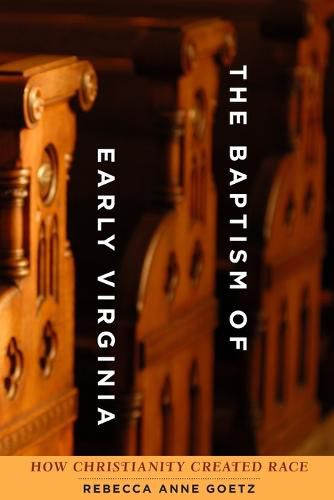Readings Newsletter
Become a Readings Member to make your shopping experience even easier.
Sign in or sign up for free!
You’re not far away from qualifying for FREE standard shipping within Australia
You’ve qualified for FREE standard shipping within Australia
The cart is loading…






In The Baptism of Early Virginia, Rebecca Anne Goetz examines the construction of race through the religious beliefs and practices of English Virginians. She finds the seventeenth century a critical time in the development and articulation of racial ideologies-ultimately in the idea of hereditary heathenism, the notion that Africans and Indians were incapable of genuine Christian conversion. In Virginia in particular, English settlers initially believed that native people would quickly become Christian and would form a vibrant partnership with English people. After vicious Anglo-Indian violence dashed those hopes, English Virginians used Christian rituals like marriage and baptism to exclude first Indians and then Africans from the privileges enjoyed by English Christians-including freedom. Resistance to hereditary heathenism was not uncommon, however. Enslaved people and many Anglican ministers fought against planters’ racial ideologies, setting the stage for Christian abolitionism in the late eighteenth and early nineteenth centuries. Using court records, letters, and pamphlets, Goetz suggests new ways of approaching and understanding the deeply entwined relationship between Christianity and race in early America.
$9.00 standard shipping within Australia
FREE standard shipping within Australia for orders over $100.00
Express & International shipping calculated at checkout
In The Baptism of Early Virginia, Rebecca Anne Goetz examines the construction of race through the religious beliefs and practices of English Virginians. She finds the seventeenth century a critical time in the development and articulation of racial ideologies-ultimately in the idea of hereditary heathenism, the notion that Africans and Indians were incapable of genuine Christian conversion. In Virginia in particular, English settlers initially believed that native people would quickly become Christian and would form a vibrant partnership with English people. After vicious Anglo-Indian violence dashed those hopes, English Virginians used Christian rituals like marriage and baptism to exclude first Indians and then Africans from the privileges enjoyed by English Christians-including freedom. Resistance to hereditary heathenism was not uncommon, however. Enslaved people and many Anglican ministers fought against planters’ racial ideologies, setting the stage for Christian abolitionism in the late eighteenth and early nineteenth centuries. Using court records, letters, and pamphlets, Goetz suggests new ways of approaching and understanding the deeply entwined relationship between Christianity and race in early America.